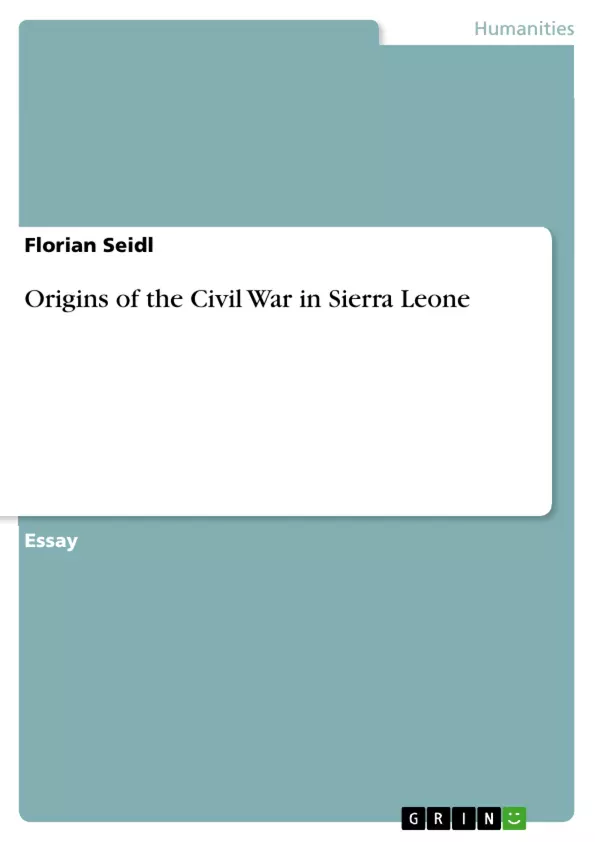This work is an essay written for an undergraduate course in African history at the University of Cape Town (South Africa), and deals with the social origins of the guerilla war in Sierra Leone.
Inhaltsverzeichnis (Table of Contents)
- Introduction: “urban origins” and “social terrain”
- Origins and character of the civil war in Sierra Leone
Zielsetzung und Themenschwerpunkte (Objectives and Key Themes)
This essay examines the claim that the social terrain of rural Africa is ill-suited for classical guerrilla warfare and that, combined with the urban origins of rebel movements, this leads to self-defeating behavior and suffering for rural populations. It uses the case of Sierra Leone as a specific example to explore this phenomenon.
- Urban origins and agendas of rebel movements
- The role of rural terrain in shaping rebel strategies
- The impact of violence on rural populations
- The influence of the lumpenproletariat on rebel movements
- The legacy of colonial rule in the context of post-colonial conflict
Zusammenfassung der Kapitel (Chapter Summaries)
Introduction: “urban origins” and “social terrain”
The essay introduces Mkandawire's argument that the violent actions of African rebels stem from their urban origins and the rural terrain that often opposes them. It explores the "urban crisis" rooted in intra-elite conflicts and economic decline, highlighting the disconnect between urban concerns and rural realities.
Origins and character of the civil war in Sierra Leone
This section details the origins and evolution of the Revolutionary United Front (RUF) in Sierra Leone. It traces the group's roots to the oppositional youth sub-culture of the lumpenproletariat in Freetown, marked by antisocial behavior and a desire for social change. It outlines the role of political factors, including the increasingly authoritarian APC regime, in shaping this sub-culture.
The section explores the RUF's formation and its ties to Libya, highlighting the diverse and sometimes contradictory motivations of its members. It examines the role of individuals like Foday Sankoh, emphasizing the lack of a clear societal agenda and the focus on violence and self-advancement. It also analyzes the RUF's initial alliance with Liberian forces and their brutal tactics, highlighting the role of economic factors and the lumpen youth in fueling the conflict.
This chapter connects the violence of the RUF to the colonial legacy, arguing that the British colonial "native administration" created a social landscape that excluded young people and fostered resentment and violence.
Schlüsselwörter (Keywords)
This essay explores the themes of post-colonial conflict, rebel movements, urban origins, rural terrain, violence, the lumpenproletariat, the Sierra Leone civil war, and the Revolutionary United Front (RUF). It examines the complex interplay of political, social, economic, and historical factors in shaping the conflict in Sierra Leone.
Frequently Asked Questions
What are the social origins of the civil war in Sierra Leone?
The war's origins are linked to an urban crisis, intra-elite conflicts, and the emergence of a marginalized "lumpenproletariat" youth culture in Freetown.
Who was the Revolutionary United Front (RUF)?
The RUF was a rebel movement led by figures like Foday Sankoh, characterized by antisocial behavior, lack of a clear political agenda, and brutal tactics against rural populations.
How did the colonial legacy influence the conflict?
The British "native administration" created a social landscape that excluded young people, fostering long-term resentment and violence in the post-colonial era.
Why is the rural terrain significant in African guerrilla wars?
Rebel movements with urban origins often find rural populations hostile or ill-suited for classical warfare, leading to self-defeating violence and suffering for civilians.
What role did external factors like Libya play?
The RUF had ties to Libya, which influenced its formation, though the motivations of its diverse members remained largely opportunistic and focused on self-advancement.
- Arbeit zitieren
- Florian Seidl (Autor:in), 2004, Origins of the Civil War in Sierra Leone, München, GRIN Verlag, https://www.grin.com/document/38851



